Summer 2019 Newsletter

Quick Content Links
President’s Message
It seems like it happens every year, but I turn around and find myself in the heat of summer wondering where half of the year has gone. Not only that, but summer seems to mark the prime intersection of our personal and professional lives, which means it can be one of the more hectic times of the year. Family vacations are on the horizon, but as folks in the aquatic resources field, we’re often working to balance that time away from the hectic fieldwork of the season (not to mention the ever-present administrative tasks).
With that said, maybe this should be the time of year when we take a few moments to slow down and think about what we are doing. I won’t pretend to offer commentary on your personal lives, but I would like to challenge you to take a few moments to reflect on your efforts relative to aquatic resources. Specifically, what elements of this field are most important to you and how are you addressing them? I might not know each reader of this message personally, but I do know that those in this field are likely driven by a passion centered around aquatic resources. Those drivers may differ among individuals, but whatever they are, they’re important to you and ultimately, the resources. It is just that these drivers/passions can be difficult to keep in focus during busy times, but again, maybe a few minutes of reflection here and there can help us along the way.
I hope you have a great rest of your summer!
Submitted by Jake Rash, NCAFS President
Dr. Jim Rice Retires from NCSU
On March 23, 2019 the Department of Applied Ecology celebrated the career and accomplishments of Dr. Jim Rice, who officially retired from NCSU on January 1 following a nearly 35-year career in the Departments of Zoology, Biology, and Applied Ecology. More than 100 people from around the US and representing all walks of Jim’s life – colleagues, students, friends, fishing buddies, family – joined in a roast and toast to celebrate Jim’s accomplishments and the role that he has played in all of our lives. Jim’s dedication to the department, his careful and thoughtful mentoring of students and junior faculty and his insightful contributions to contemporary challenges facing our environment and natural resources will be greatly missed.
Jim started his academic journey at St. Louis University, where he received a BS degree in Biology in 1978, followed by MS and PhD degrees in Zoology from the University of Wisconsin (1981 and 1985). While in graduate school he and his wife, Cindy, took part in two successful spawning events, resulting in a son, Daniel, and a daughter, Angela, thereby realizing Jim’s longstanding evolutionary dream of demonstrating his reproductive success and increasing his fitness. Soon after finishing his PhD, drawn by the scent of pork barbeque with a vinegar sauce, Jim joined the Department of Zoology at NCSU. He moved through the ranks of Assistant Professor, Associate Professor and Professor over the next thirteen years, during which time he also served as Department Extension Leader and, following promotion to Professor, Director of Graduate Programs.
Over the years Jim witnessed many changes in the department, chased off an impressive number of department heads, published more than 100 peer-reviewed journal articles, books, book chapters, technical reports and Extension publications, trained dozens of graduate students and secured millions of dollars in funding to support his research program. Highlights of Jim’s research career include publishing a Science Citation Classic (a paper on larval fish recruitment that has now been cited more than 1300 times), adding substantially to our scientific understanding of larval fishes, bioenergetics, hypoxia, and mercury dynamics, winning many publication and presentation awards, training an amazing group of graduate students that remain good friends and colleagues, and regularly beating the pants off of everyone at AFS raffles.
In addition to admirable scientific and mentoring achievements, Jim regularly dedicated his time and energy to serving his department, college, university and professional societies, including – and especially – the NC Chapter of the American Fisheries Society. Among the many service and leadership positions Jim held over the years were Associate Editor for North American Journal of Fisheries Management, Board of Directors for the NC Wildlife Federation, President of the NC Fisheries Workers Association, Northern Regional Advisory Committee to the NC Marine Fisheries Commission, and President of the NC Chapter of the American Fisheries Society.
Over the years Jim made many friends and influenced countless lives at the university, in state and federal agencies, NGOs, and among the general public of North Carolina, who interacted regularly with Jim in his NC Cooperative Extension responsibilities associated with small impoundments across the state. Throughout his thirty-plus year career Jim could always be counted on for reliable and engaging participation, steady guidance and thoughtful input; whether teaching students new statistical techniques or how to drive a vehicle with a manual transmission, providing careful input and thoughtful guidance on faculty hiring committees, or delicately popping thousands of balloons in his university office (each one individually placed there by a team of dedicated graduate students), Jim could be counted on to tackle the challenge with enthusiasm and good cheer (just don’t ask him to do it before 9 a.m.).
So, a toast to Jim and his successful and influential career. To quote Doug Larson: “If people concentrated on the really important things in life there’d be a shortage of fishing poles.” Best fishes for a long and relaxing retirement!
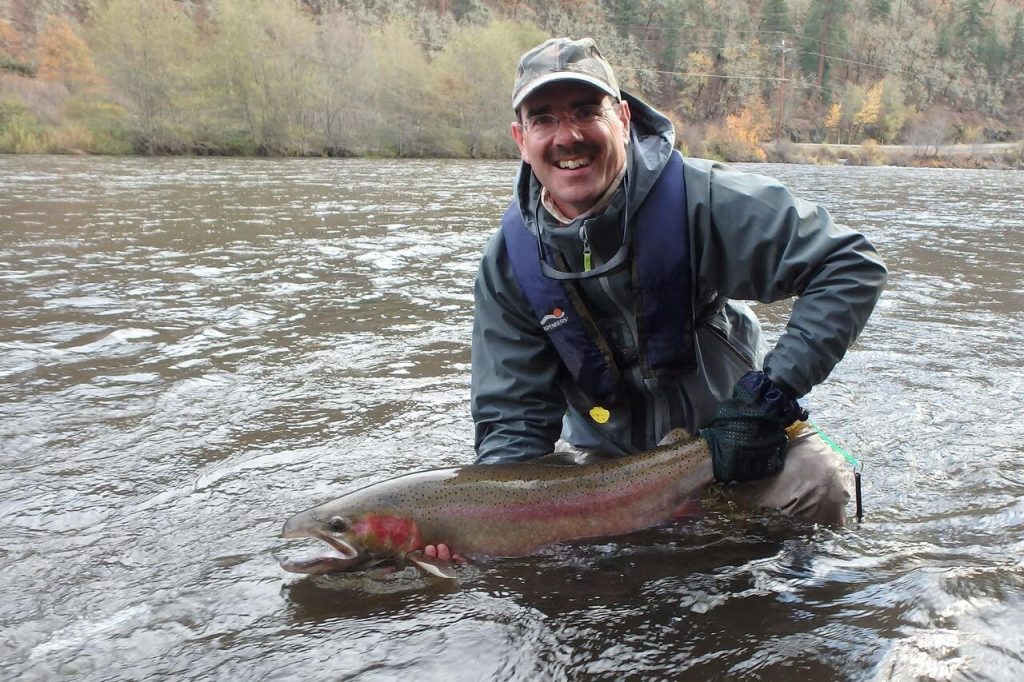
Submitted by Derek Aday, NC State University
NCAFS Treasurer’s Report as of 7/9/2019
1. NCAFS checking – $11,155.61;
2. NCAFS PayPal — $219.96;
3. NCAFS Edward Jones General Fund –$55,537.32;
4. NCAFS Edward Jones Ichthus (Student) Fund – $29,698.19;
5. Robust Redhorse Conservation Committee – $10,102.87;
The Executive Committee has been working hard to update the Procedures Manual to incorporate the undergraduate award (voted on during the 2018 business meeting) and the new donation request procedures and funding guidelines.
Since the last newsletter, NCAFS EXCOM received two donation requests for the April 1 deadline. April Lamb, NCSU’s Department of Applied Ecology graduate student, was awarded $1000 from the Ichthus Fund to accommodate volunteers for a habitat restoration project in Lake Mattamuskeet. In addition, a total of $1,000 was awarded to NCWRC’s Aquatic Wildlife Diversity group to aid in the production of a mussel poster that can be distributed widely and used for educational and awareness programs throughout the state. If you would like to apply for funding grants, the next deadline is November 1, 2019. Download a donation request form from our website. Please contact Kelsey Lincoln at [email protected] with any financial or funding request questions.
Submitted by Kelsey Lincoln, NCAFS Secretary/Treasurer
NCAFS Member Spotlight
Dylan Owensby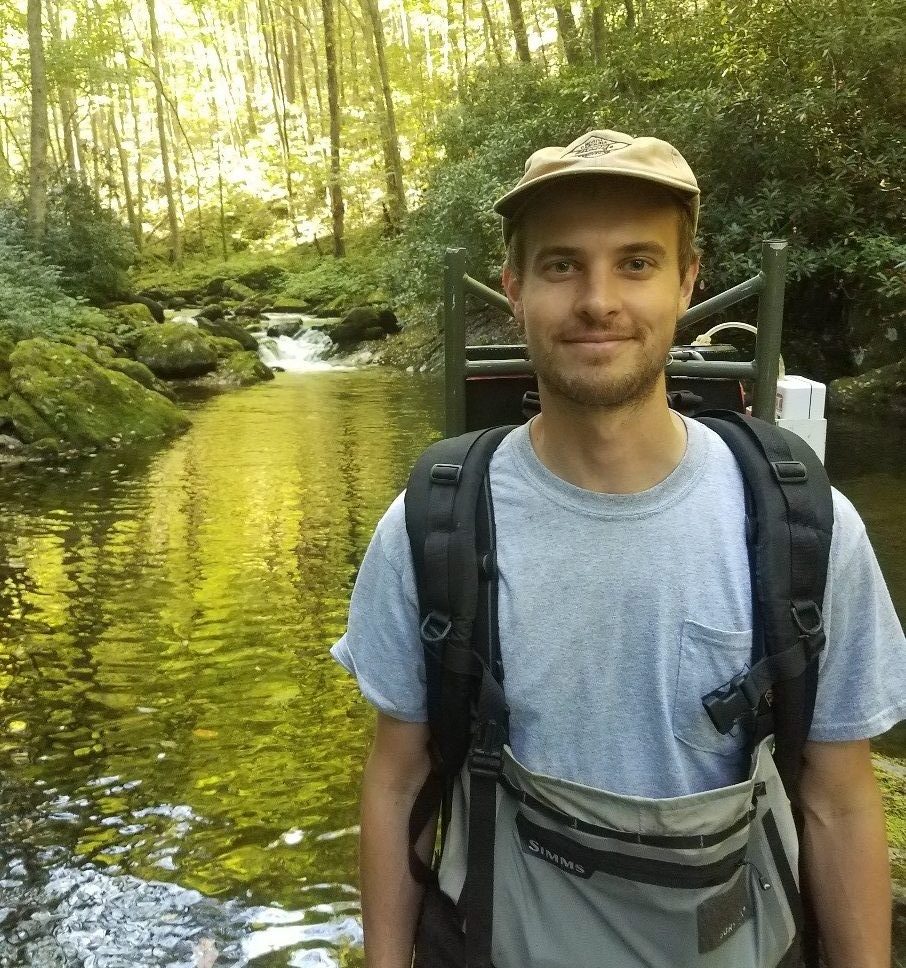 Dylan is a native of western North Carolina where he grew up on the banks of the mighty Catawba River in Morganton, NC. He received a B.S. in Environmental Sciences from the University of North Carolina in 2011. After his time at Chapel Hill, Dylan moved to Yellowstone National Park where he worked as an intern with the Lake Trout gillnetting crew. He then returned to North Carolina where he worked as a research technician at North Carolina State University helping graduate students Kelsey Lincoln and Dan Brown with White Bass and Largemouth Bass radio telemetry projects in the Piedmont and Coastal Plain. He later completed a M.S. degree in Zoology from North Carolina State University in 2015 under the guidance of his advisors, Jim Rice and Derek Aday. His research project studied the fate of stocked juvenile Muskellunge in the New and French Broad Rivers in western North Carolina.
Dylan is a native of western North Carolina where he grew up on the banks of the mighty Catawba River in Morganton, NC. He received a B.S. in Environmental Sciences from the University of North Carolina in 2011. After his time at Chapel Hill, Dylan moved to Yellowstone National Park where he worked as an intern with the Lake Trout gillnetting crew. He then returned to North Carolina where he worked as a research technician at North Carolina State University helping graduate students Kelsey Lincoln and Dan Brown with White Bass and Largemouth Bass radio telemetry projects in the Piedmont and Coastal Plain. He later completed a M.S. degree in Zoology from North Carolina State University in 2015 under the guidance of his advisors, Jim Rice and Derek Aday. His research project studied the fate of stocked juvenile Muskellunge in the New and French Broad Rivers in western North Carolina.
After grad school, Dylan moved back to Montana to work as a fish technician for Montana’s Fish, Wildlife & Parks Department. His time in Montana was spent working with trout and other fish species in the Missouri River and its tributaries. Once again, he moved back to NC, where he began working as a hatchery and trout technician with the North Carolina Wildlife Resources Commission. For the past year, Dylan has been working for NCWRC as the Aquatic Wildlife Diversity (non-game) Biologist for the Western Region of the state, where he works on the conservation of native freshwater fishes, mussels and crayfishes. During his free time, Dylan enjoys hiking, fishing, and exploring with his wife, Katelyn, and their son, Myles.
NC State University Student Fisheries Society Update – July 2019
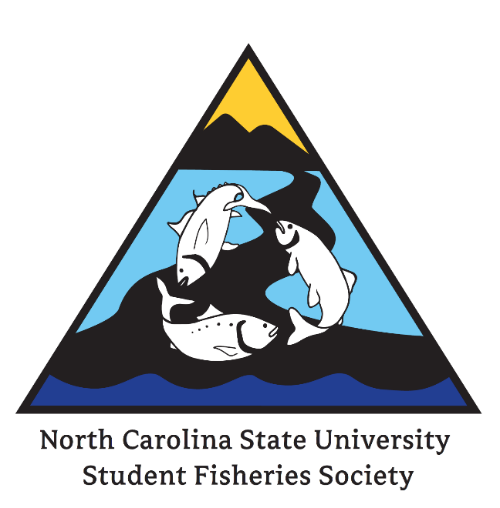 The NC State subunit had a productive spring semester leading into the summer. We were busy with conferences, fundraising, monthly meetings, and especially outreach! At our first 2019 meeting, we unveiled our revamped logo and stocked up on new merchandise. The new logo (pictured at right) preserves fishes from the former logo as it emphasizes our members’ fisheries focus from the mountains to the sea in North Carolina and beyond. T shirts and related swag can be purchased from SFS — just contact April or Jennifer.
The NC State subunit had a productive spring semester leading into the summer. We were busy with conferences, fundraising, monthly meetings, and especially outreach! At our first 2019 meeting, we unveiled our revamped logo and stocked up on new merchandise. The new logo (pictured at right) preserves fishes from the former logo as it emphasizes our members’ fisheries focus from the mountains to the sea in North Carolina and beyond. T shirts and related swag can be purchased from SFS — just contact April or Jennifer.
Meetings: Our monthly meetings featured free dinners and fisheries fellowship as always, along with an opportunity to hear from and network with fisheries professionals, including individuals from the North Carolina Wildlife Resources Commission, who joined us as guest speakers. We also upped the ante on fellowship by embracing technology and again offering virtual attendance, especially for the fisheries students and faculty remotely located at NC State’s Center for Marine Sciences and Technology (CMAST) on the coast. Our final spring semester meeting in April featured a discussion on natural resources advocacy and participating in the public comment process – a timely topic in light of the proposed change to the Waters of the United States rule by the US EPA.
Fundraising: We held our annual fundraising raffle in February at the NC Chapter AFS annual meeting. We are grateful to the dozens of businesses, organizations, and individuals who donated items for the raffle, ranging the spectrum from zoo tickets and books, to coveted fish art and high-tech gear! We are especially grateful to the NC Chapter members for opening their wallets and purchasing raffle tickets and our new logo t-shirts. Through this generous support, we raised over $2,150 from the raffle and sales, which is a new fundraising record for the club. These funds support our monthly meetings, supplies for outreach and service events, and especially the three student travel awards that we present each December to deserving undergraduate and graduate members.
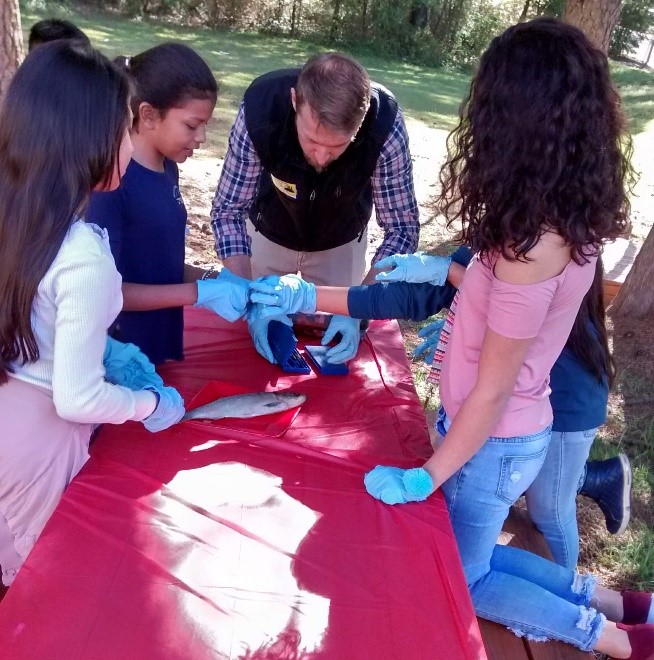
NCSU SFS alum, Dr. Gus Engman, pictured above with students.
Outreach: On to fisheries outreach! The spring semester is our busiest time for outreach every year, as Shad in the Classroom and the North Carolina Family Fishing Fiesta have become flagship events over the past several years. In partnership with the NC Museum of Natural Sciences, we visit elementary, middle, and high school classes for Shad in the Classroom from March through May. Our members give lessons on anatomy, ecology, and conservation, while providing a hands-on specimen dissection experience for K-12 students. This year we donated more than 66 person-hours to class visits and reached an estimated 639 students.
The Family Fishing Fiesta (AKA Fiesta de Pesca) is an annual event hosted by the North Carolina Wildlife Resources Commission and North Carolina State Parks. This fun-filled, day-long celebration is free and open to the public, offers a bilingual experience, and has a variety of activities for the whole family. Among ~30 activities, visitors can learn how to cast and fish, play games, see birds of prey up close, and even go canoeing. On April 7, NCSU Student Fisheries Society again joined the fun and staffed the Lure Demonstration, Knot Tying, Backyard Bass, and Spot the Bluegill stations. We devoted more than 45-person hours and reached many of the 730+ people attended the 2019 Fiesta de Pesca!
We had also planned to do our annual Rocky Branch Stream Cleanup this past Spring, but unfortunately our efforts were delayed due to a record- breaking rainy season coupled with scheduling conflicts. Not to fret – we plan to follow up with an early season cleanup this fall.
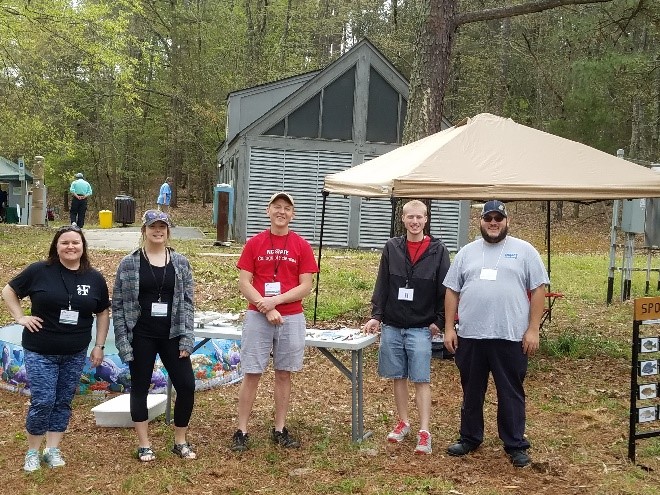
Left: Jennifer Archambault, April Lamb, Mike Walter, Austin Mueller, and Matt Florez volunteer at the Family Fishing Fiesta. Right: Mike Walter shows an aspiring young angler how to tie the all-important clinch knot!
Conferences: Several of our club members attended and presented at professional conferences this year, including the Southern Division AFS meeting, NC Chapter AFS meeting, the Tidewater Chapter of AFS meeting, the Freshwater Mollusk Conservation Society meeting, and the World Aquaculture Society meeting. As the year goes on, many of our members will be gearing up to attend the AFS & The Wildlife Society Joint Conference in Reno, NV.
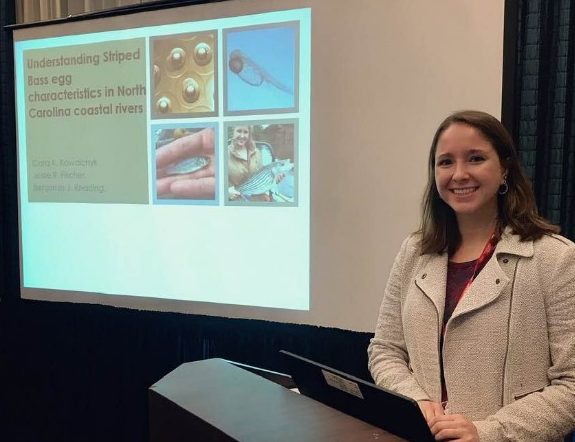
Cara Kowalchyk, recipient of the 2019 NCAFS Richard L. Noble Best Student Paper Award.
Scholarships and Awards: Many of our members were awarded scholarships and awards this year. At the Southern Division AFS meeting, Stephen Parker was awarded the Robert M. Jenkins Memorial Reservoir Research Scholarship for his work on North Carolina’s many reservoirs. At the NC Chapter AFS meeting, Cara Kowalchyk (pictured, right) won the Richard L. Noble Best Student Paper Award for her presentation entitled, “Variability of Striped Bass Egg Characteristics in North Carolina Coastal Rivers”. Club co-president, Jennifer Archambault, received a Student Travel Award from the Freshwater Mollusk Conservation Society. Finally, in Spring of 2019 club co-president April Lamb was one of two students awarded the Noreen Clough Scholarship for Females in Fisheries, which is supported by the Black Bass Conservation Society, as well as a $1,000 Project Funding grant from the Ichthus Fund of the NC Chapter AFS.
Other Member News and Summer: We wrapped up the spring semester with a cookout and camping social to celebrate everyone’s hard work, dedication to the fisheries profession and outreach, and personal achievements. This included the graduation of our 2018 Undergraduate Vice President, Austin Mueller, who earned his BS in Fisheries, Wildlife, and Conservation Biology and was recently accepted to a graduate assistantship at the University of Central Missouri. We also have two long-time members and former executive committee members, Emilee Briggs and Stephen Parker, who will be defending their M.S. theses this summer. Emilee’s research focuses on how urbanization affects stream fish communities, and in August she will be starting a PhD program at West Virginia University. Stephen Parker’s research focuses on linking reservoir characteristics to fish assemblage structure and population dynamics of recreationally important species, and in August he will be starting a PhD program at the University of Florida. As we gathered on the shores of John H. Kerr Reservoir, members enjoyed some peace and quiet, fellowship, hot dogs on the grill, and of course, some good fishing to end the semester!
Most of our membership has scattered for the summer, working on graduate research or on internships. We’ll look forward to a new buzz of activity to kick off the Fall 2019 semester in August. Our current executive committee (calendar year 2019) members are: Co-Presidents Jennifer Archambault ([email protected]) and April Lamb ([email protected]); Secretary Linnea Andersen ([email protected]); Treasurer Mike Walter ([email protected]); and Undergraduate Vice President Connor Neagle ([email protected]).
Drop us a line if you want to know more about our subunit! Until next time, enjoy the view from our Kerr Lake campsite!
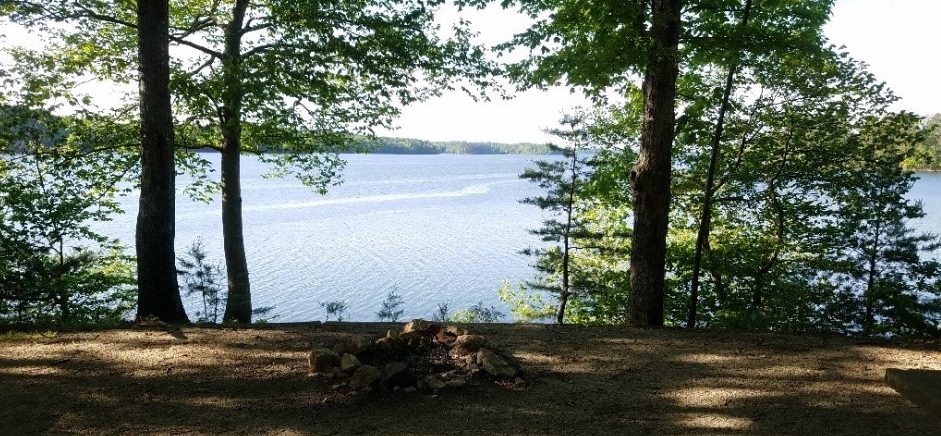
Respectfully submitted, Jennifer Archambault & April Lamb NCSU SFS Co-Presidents
Good Work! – Recent Publications by NCAFS Members
- Engman, A.C., G.M. Hogue, W.C. Starnes, M.E. Raley, and T.J. Kwak. 2019. Puerto Rico Sicydium goby diversity: species-specific insights on population structures and distributions. Neotropical Biodiversity 5: 22-29. https://www.tandfonline.com/loi/tneo20
- Engman, A.C., T.J. Kwak, J.R. Fischer, and C.G. Lilyestrom. 2019. Fish assemblages and fisheries resources in Puerto Rico’s riverine estuaries. Marine and Coastal Fisheries: Dynamics, Management, and Ecosystem Science 11: 189-201. https://DOI: 10.1002/mcf2.10072
- Flowers, H.J., T.J. Kwak, J.R. Fischer, W.G. Cope, J.M. Rash, and D.A Besler. 2019. Behavior and survival of stocked trout in southern Appalachian Mountain streams. Transactions of the American Fisheries Society 148: 3-20. https://DOI: 10.1002/tafs.10113
- Kwak, T.J., A.C. Engman, and C.G. Lilyestrom. 2019. Ecology and conservation of the American eel in the Caribbean region. Invited manuscript in a special journal issue on Research, Management and Conservation of Anguillid Eels. Fisheries Management and Ecology 26: 42-52.
https://DOI: 10.1111/fme.12300 - Asch, R.G., C.A. Stock, and J.L. Sarmiento. 2019. Climate change impacts on mismatches between phytoplankton blooms and fish spawning phenology. Glob Change Biol. 2019;00: 1–16.
https://doi.org/10.1111/gcb.14650
Call to Action!
If you want to contribute, have a story idea or would like us to include something in next quarter’s newsletter, email Kevin Hining [email protected] or give him a call at 828-386-8687.
Also, if you want to become more involved with one of the many great NCAFS committees then please check this link for information about each one, contacts, etc., https://nc.fisheries.org/who-we-are/committees/
 Valuable Links
Valuable Links
The American Fisheries Society Home Page offers a wealth of links to assist you in your fishy endeavors. This and archived NCAFS newsletters, along with links, chapter information, and upcoming meetings, can be found here on our own website.
